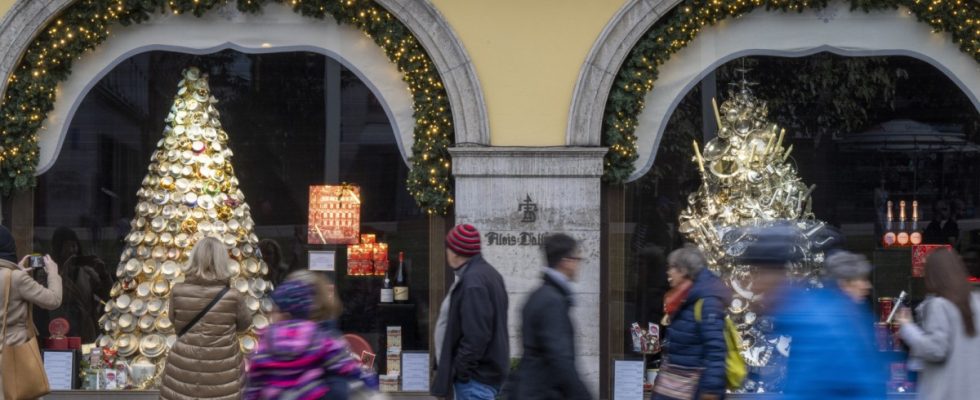In Bavarian retail, joy over the ongoing Christmas business is subdued. The Bavarian Trade Association (HBE) expects a nominal increase in sales of two percent to 14.3 billion euros for November and December. Adjusted for inflation, this is a decrease of five percent compared to last year. “The dealers’ expectations are mixed,” said managing director Wolfgang Puff on Thursday in Munich.
“There is great uncertainty among customers and dealers given the current situation,” said HBE President Ernst Läuger. Inflation, high energy prices and the economic downturn are slowing consumers’ willingness to buy. This particularly affects online retail: after twelve years of constant growth, sales are suddenly stagnating – adjusted for prices, the association even expects a “minus of four percent.”
Sales on Black Friday and Cyber Monday, which are part of the Christmas business, are expected to fall by a nominal three percent this year from 930 to 900 million euros, said Puff. Not only online retailers but also local stores are now offering Black Friday discounts. “Dealers have become hybrid, like customers.” On average, the price reduction is around six percent.
On the other hand, local shops felt more interested in shopping in the city, said Läuger. In Nuremberg and some other cities, customer frequency is even higher than before the Corona years. The weather also seems to cooperate: when it’s cold, the mulled wine at the Christmas market tastes better, and the demand for warm winter clothing increases.
528 euros – that’s how much every person in Bavaria spends on average
Every person in Bavaria is expected to spend an average of 528 euros during the Christmas season, said Puff. The HBE includes sales in November and December, including spending on food and online purchases amounting to around 2.6 billion euros. “Depending on the industry, we make a quarter to a third of annual sales in the Christmas business” from the beginning of November, said Puff. After business has remained stable over the past eleven months, it is likely to continue until New Year’s Eve, said Läuger.
The warehouses of the local shops are full. Only when it comes to food, one or two products might not be available because of the price war between branded goods manufacturers and retailers like Edeka, said the association president. Strikes by employees in wholesale and retail are also noticeable here and there. The collective bargaining between the employers and the Verdi union is deadlocked and there will be no further rounds of negotiations this year.
A third of the gifts under the Christmas tree are likely to be vouchers and cash gifts – and the trend continues to rise, said association spokesman Bernd Ohlmann. Therefore the exchange rate drops. After Christmas, the shops were not empty because many recipients redeemed their vouchers. Books, stationery, watches, jewelry, toys, sporting goods and warm winter clothing are also high on the shopping lists.
The Schrobenhausen toy retailer Christian Krömer, who operates 19 stores in Bavaria, said: “We are very confident about the stationary business.” In the two Corona years, many adults rediscovered gaming, and after Corona more people would come back to local shops. Online shipping, however, is running weaker than expected. According to HBE, the almost 60,000 Bavarian retail companies employ 320,000 people and generate 71.5 billion euros in sales annually.

